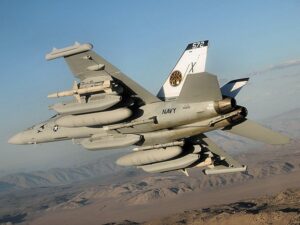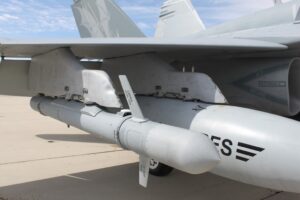Spectrum (EW) Should Be A Warfighting Domain: Rep. Bacon
Posted on

Then-Brig. Gen. Bacon celebrates his “fini flight” before leaving command.
WASHINGTON: After two decades of decline, American electronic warfare is recovering, but not fast enough, says general-turned-congressman Rep. Don Bacon. What the military needs to do, Bacon said is to elevate the electromagnetic spectrum to an official domain of warfare — alongside land, sea, air, space, and cyberspace — and appoint general officers as EW advocates in all four services and to the joint staff.
“As a young EWO (Electronic Warfare Officer), there was no doubt we had the best electronic warfare capabilities in the world,” Bacon said. After the Soviet Union fell, however, “we let it atrophy for a decade-and-a-half.”

Rep. Don Bacon
“Today, I would say that we’ve turned the corner, (but) we’re in first gear and we need to be in fourth or fifth,” Bacon told the Association of Old Crows, the colorfully named electronic warfare professional and trade group. “It’s time to shove it into high gear.”
Bacon is a freshman legislator, elected in 2016. While he sits on the House Armed Services Committee, the seniority ranking puts him as the third Republican from the bottom. So why would anyone listen to him? Before he joined the Congress he spent 34 years in the Air Force, logging more than 1,700 flight hours and rising to the rank of brigadier general (one star). Oh, and he served in and over Iraq.
When it comes to electronic warfare in particular, Bacon is probably the most qualified congressman. A former EWO, he served in the Air Force’s EC-130H Compass Call — one of the few jamming aircraft the service didn’t retire after 1991 — and rose to command first an EC-130H squadron and then the entire 55th Electronic Combat Group.
So while a new face on the Hill, I hear that Bacon is well known and respected for his knowledge on military matters. No amount of expertise can substitute for seniority, of course, so don’t expect him to move major legislation by himself. But on highly technical topics, he has a better shot than most freshman congressman of getting senior legislators to listen to him. His multiple identities as career airman, Pentagon veteran, and freshman legislator make him uniquely positioned to be a bridge between the highly technical, insular world of electronic warfare and the rarified circles that make policy and set budgets.

An Air Force EC-130H Compass Call electronic warfare aircraft in Afghanistan.
Doctrine, Domain, & Leadership
“Up front, we’ve got to get our doctrine right,” Bacon told the EW conference. The biggest thing we need to change about our thinking: elevate the electromagnetic spectrum — through which all radio transmissions, wireless data, and radar beams must pass — to a domain.

Navy EA-18G Growler with jamming pods
“We need to be clear that electronic warfare, the electromagnetic spectrum, is indeed a physical domain. It is a separate physical domain. It’s a scientific fact,” Bacon said. “And I ask you: ‘Why don’t we call it that’? And you go, ‘Well, because it costs money’… We ignore the truth because we’re worried about what the price tag’s going to be.”
What makes a domain, besides money? A domain is an area of military operations characterized by unique physical properties that require specialized forces with their own way of operating. Just as the air requires planes, the sea requires ships, and space requires satellites and rockets, the electromagnetic spectrum requires radios, radars, antennas, and jammers. Domains are physically distinct, but they can overlap each other. Just as air and airpower extend over both land and sea, and space overtops them all, cyberspace exists wherever electronic circuits do, and electromagnetic radiation goes everywhere.
Whether the spectrum should be a domain is a longstanding and lively debate in military circles. Skeptics say there are too many domains already, and that radio and radar are already part of operations in the existing domains. In the last year-and-a-half of the Obama administration, however, the Pentagon’s Chief Information Officer and the Vice Chairman of the Joint Chiefs both have said establishing an EMS domain was under consideration. Since the election I’ve heard nothing, probably because too many key positions are still unfilled, not because of some conscious change of policy.

An “Intrepid Tiger II” jamming pod on an F-18 Hornet
To ensure electronic warfare efforts continue despite such political upheavals, Bacon also proposes institutionalizing EW advocacy in the Pentagon. In his youth, the Air Force had a two-star officer in charge of electronic warfare, Bacon said, but that position was abolished. Now, he said, the closest equivalent is a single one-star at US Strategic Command, which has EW advocacy as one among many more pressing missions.
“I applaud the fact that we have a one-star general at STRATCOM, that’s a step forward, (but) I think we need the same advocacy on the Joint Staff and we need the same advocacy in each of the services,” Bacon said. “Let’s get good advocates on the Joint Staff that work with ATL (Acquisition, Technology, and Logistics, the Pentagon folks who develop and buy weapons), that are strong advocates for electronic warfare, electromagnetic spectrum operations. We should have a clear belly button in each service — who’s the lead for electronic warfare?”
Today, there’s no clear answer to that question. Maybe next year’s defense bill will change that.
Subscribe to our newsletter
Promotions, new products and sales. Directly to your inbox.
